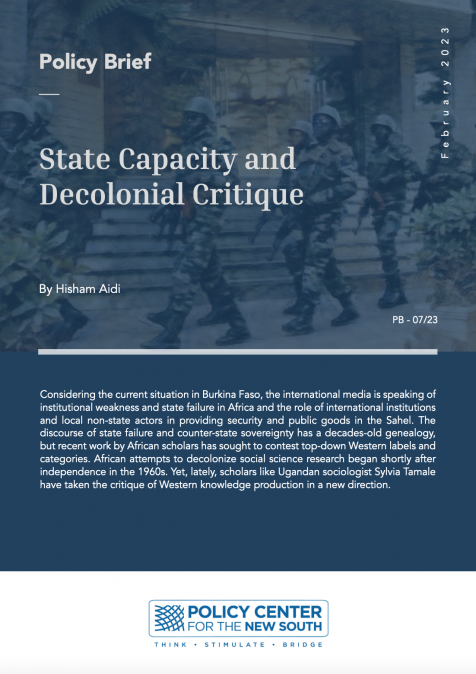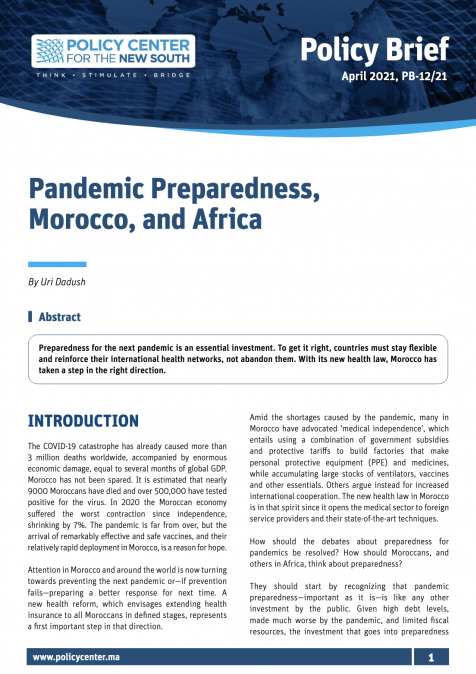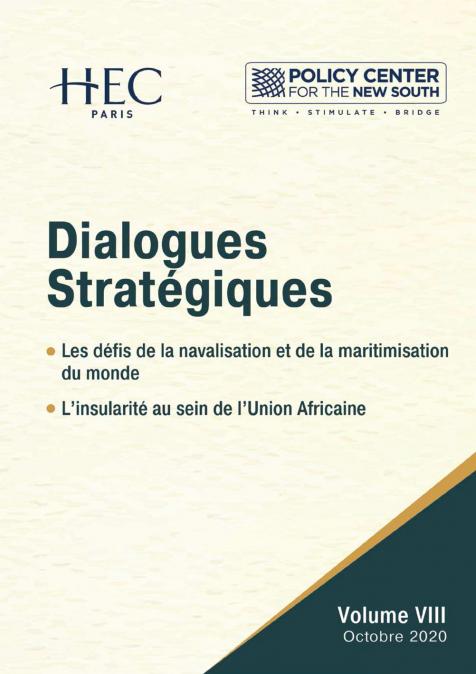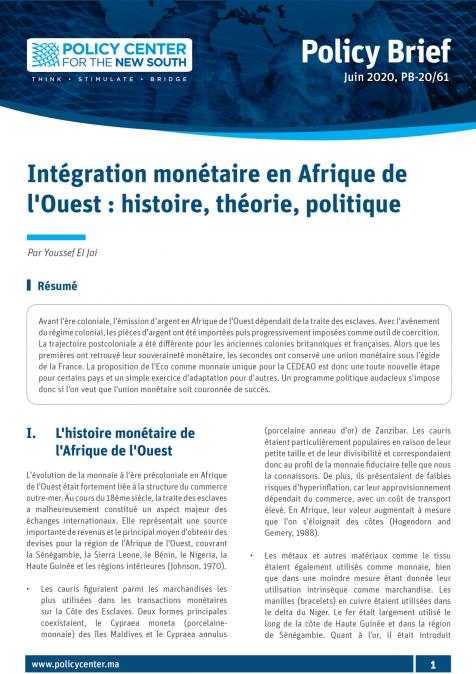Publications /
Policy Brief
Considering the current situation in Burkina Faso, the international media is speaking of institutional weakness and state failure in Africa and the role of international institutions and local non-state actors in providing security and public goods in the Sahel. The discourse of state failure and counter-state sovereignty has a decades-old genealogy, but recent work by African scholars has sought to contest top-down Western labels and categories. African attempts to decolonize social science research began shortly after independence in the 1960s. Yet, lately, scholars like Ugandan sociologist Sylvia Tamale have taken the critique of Western knowledge production in a new direction.
As French Special Forces prepare to depart Burkina Faso, commentators have begun speculating that the Russian mercenary group Wagner will be arriving to assist the Burkinabe leader Captain Ibrahima Traore in countering a ten-year Islamist insurgency that has displaced an estimated two million people.1 Once again, the media is speaking of institutional weakness and state failure in Africa and the role of international institutions and local non-state actors in providing security and public goods in the Sahel. As we show below, the discourse of state failure and the rebel/Jihadi governance model has a decades- old genealogy. However, recent work by African scholars has sought to contest top-down labels and Western categories. African attempts to decolonize social science research began shortly after independence in the 1960s, and scholars like Ugandan sociologist Sylvia Tamale have taken the critique of Western knowledge production in a new direction.
POST-COLD WAR
Numerous analysts have observed the concept of a “failed state” emerged in the wake of the Cold War. Scholars point to the CIA State Failure Task Force’s 1995 report, which introduced state failure as “a new term of serious, political crisis exemplified by recent events in Somalia, Bosnia, Liberia, and Afghanistan.”2 The concept “failed state” would enter the public discourse after September 2001. The scholarship on state formation, however, begins in the colonial era. The imperial imposition of bureaucratic state structures on the developing world often meant destroying and disrupting preexisting social and political structures. As one political scientist has written, “the new arrangements often failed to take root effectively, leaving many populations with neither authoritative local institutions nor robust Weberian-style states.”3 At independence, the colonized territories (or mandates) would be granted “juridical recognition” by the United Nations and the Great Powers, even while they lacked “empirical sovereignty” and territorial control. The frailty of these newly-independent states soon became evident, as Bangladesh split from (West) Pakistan, and the Biafran War almost splintered Nigeria. Cold War rivalries between the superpowers often prevented weak states from collapsing, but proxy wars and economic intervention also derailed local processes of state formation. After 1990, superpowers withdrew their support, leading states like Zaire, Somalia, Afghanistan, and Yugoslavia began to break up. Western analysts would begin to speak of “failed states” as a return to a Hobbesian “state of nature,” a violent situation of “Warre, where every man is Enemy to every man.”
It’s worth noting that there is still no agreement on the definition of a “failed state.” The Washington-based “Fund for Peace,” for instance, maintains that if a state has lost control of its territory, and does not have a monopoly over the use of physical force – that qualifies as “state failure.”4 Harvard scholar Robert Bates also speaks of a state’s declining capacity to control its territory – but sees state failure more specifically as “the implosion of the state,” where the bureaucratic apparatus becomes an “instrument of predation.”5 In his study “States at Risk” (2006) Ulrich Schneckener has proposed a “stage model,” as a way to operationalize “state failure,” contending that state formation should include three ingredients (monopoly of violence, legitimacy, and the rule of law) with the former (monopoly on violence) a precondition for the emergence of legitimacy and rule of law. He has also proposed four types of statehood: 1/ consolidated or consolidating states – where the basic functions of government are working; 2/ weak states -where the government has a monopoly over means of violence, but its legitimacy is strongly challenged and rule of law is uneven; and 3/ failing and 4/ failed and collapsed states, where the state cannot supply governance and sub-national groups (and sometimes external actors) are providing order.
Critics have underscored the top-down, selective nature of the “failed state” label, noting that it is often pinned on states that refuse to do Western bidding. Looking at the cases of Afghanistan, Liberia, Nigeria’s Niger Delta, Sudan and Somalia, Morten Boas and Kathleen Jennings conclude that Western officials will apply the moniker “failed” to countries where “recession and informalization” of state functions threatens Western interests. Yet Western- backed countries where state capacity is declining are not branded “failed states” – their “informalization” is viewed as aiding investment and modernization.6
In addition to being nebulous and difficult to operationalize, the concept of “state failure” remain wedded to Max Weber’s gendered, Eurocentric understanding of the state. The conventional definition is anchored in a historical European context and cannot serve as an exclusive standard. As Joel Migdal has observed, “Actual states are deviations from the ideal or corrupted versions of the ideal.” A more instructive way of understanding the Central African Republic or Congolese state should be by focusing on the ongoing negotiations over power and authority between state and societal actors – the “contending coalitions that have cut across both” – state and society – “and blurred lines between them.” The role of ostensibly peripheral actors – like warlords and chieftains – is critical in this process.
COLONIAL DISRUPTION
Historians have disagreed on the impact of colonialism on the African continent. The Kenyan historian Ali Mazrui maintained that colonialism set in motion a “revolution of epic proportions” with generational repercussions, inasmuch as colonial rule incorporated Africa into the world economy, starting with the trans-Atlantic slave trade “which dragged African labor into the emerging international capitalist system.”7 The subsequent carving up of Africa at the Berlin Conference of 1885 would derail political development, rendering the continent subordinate to a Western-dominated international state system. In terms of knowledge production, colonialism’s impact would be pernicious: “What Africa knows about itself and what different parts of Africa know about each other have been profoundly influenced by the West.” Ina similar spirit, the Kenyan novelist Ngũgĩ wa Thiong'o once wrote: “Berlin of 1884 was affected through the sword and the bullet. But the night of the sword and the bullet was followed by the morning of the chalk and the blackboard.”
Arguing against Mazrui (and Ngugi) was the Nigerian historian Jacob Ade Ajayi of the University of Ibadan who took a nationalist position, claiming that colonialism lasted roughly 75 years (from 1885 to 1960), and was just “an episode in African history.”8 Even under imperial rule, African people were able to shape history albeit in structural conditions set by European rulers. Mazrui would retort that just because colonial occupation ended in 1960 does not mean that African states have overcome colonialism’s effects. In recent years, scholars have revisited this debate on colonialism’s impact – initiated by scholars like Mazrui and Ajayi, and political stalwarts like Frantz Fanon and Kwame Nkrumah. The current decolonial scholars appreciate Kwame Nkrumah’s concept of “neo-colonialism” advanced shorty after independence and build on the dependency framework developed by Egyptian economist Samir Amin. But they contend that the early anti-colonial theorizing focused on conquest and economic exploitation, which is simply one strand of what they term “coloniality.” Thus, scholar Nelson Maldonado Torres, defines decoloniality as the dismantling of the matrix of power that is coloniality, and conceptions of knowledge that reproduce of racial, gender, economic and geo-political hierarchies.9 Although the first wave of anti-colonial theorists spoke of cultural liberation and “new consciousness,” the pioneers gave short shrift to “epistemic violence.” Decolonial theorists – many of whom hail from Latin America – also criticize the earlier post-colonial scholars to task for taking the conquest of Asia and Africa in the mid-18th and 19th century as their point of departure, neglecting the fact that colonization (and resistance) began in Latin America in the 15th century.
CONSOLIDATING AFRICA
Mazrui argued that where Africa’s borders are drawn has important political, social, and cultural implications, defining not only boundaries of citizenship and inclusion but also political discourse and policies of governance. Colonial actors had turned the Red Sea and the Sahara into artificial divides; he called for transcending these colonial divides, and for studying Africa in conjunction with the Middle East. Mazrui coined the concept of “Afrabia,” noting how Madagascar, which is separated from the African continent by the 500-mile-wide Mozambique Channel, is considered part of Africa, and yet Yemen – which is only “a stone’s throw,” and linguistically and culturally tied to the Horn of Africa — is not. Since independence, in part because of Mazrui and other pan-African scholars’ critiques, these categories are being reimagined as myriad states, and non-state actors treat the Sahara and the Red Sea as connectors instead of barriers.
In the post-colonial era, various actors tried to transcend these colonial divides with various “Middle Eastern” actors on the African continent, such as Nasser’s Egypt, Muammar al Qaddafi’s Libya, and the Front de Libération Nationale’s (FLN) Algeria, situating themselves within an African context. Upon coming to power, for instance, Gamal Abdel Nasser would famously declare that Egypt falls within “three circles” – Arab, African, and Islamic. In 1953, he wrote: “If we consider...the continent of Africa—I may say without exaggeration that we cannot, under any circumstance, however much we might desire it, remain aloof from the terrible and sanguinary conflict going on there today between five million whites and 200 million Africans. We cannot do so for an important and obvious reason: we are in Africa.”10 The Egyptian president aligned Cairo with the Soviet Union through his two decades of rule and supported liberation movements from Algeria to Rhodesia to the Zanzibari revolution, where Africans revolted against Afro-Arab ruling class. Leaders like Julius Nyerere of Tanzania and Kenneth Kaunda of Zambia had a vision of Pan-Africanism that included North Africa.11 And from 1963, when the Organization of African Unity was founded, until 1967, Egypt was the largest contributor to the OAU Liberation Fund. Yet Nasser’s policies also drew criticism within Africa. Nasser, Kwame Nkrumah of Ghana, and Sekou Touré of Guinea belonged to the more leftist Casablanca school which called for African unity, a pan-African army, and supported the FLN against France. Opposed to them was the conservative Monrovia camp – which included Nigeria, Senegal, and Cameroon – that stressed African statehood over pan-nationalism and supported French rule in Algeria. Kamuzu Banda of Malawi was wary of Nasser’s interventionism and wanted a “sub-Saharan pan-Africanism.” Israel also tried to counter Egypt’s influence. Nkrumah, an ally, and competitor of Egypt – had the Trinidadian ex-Communist intellectual, George Padmore as an adviser; the latter was sympathetic to Zionism and recommended building ties with Israel to check Egyptian ambitions. Padmore invited Golda Meir to address the All-African People Conference in Accra in 1958.
In American and European academia, international relations and comparative politics have long treated North Africa as separate and distinct from “sub-Saharan Africa.” In American international relations, the school of thought known as political realism marginalized Africa, with their focus on the international system’s leading states – states “that make a difference,” in Kenneth Waltz’s memorable words. International relations scholars studied the alliances and balance of power relations of Egypt and North African states, in part because they were seen as central to the American national interest but also because, unlike sub-Saharan states, they were seen as strong states with the capacity to project power across state borders. African states, by contrast, were viewed as weak (“failing”), and largely concerned about regime longevity; North African states, in contrast, were seen as boasting higher capacity than sub-Saharan states. In a similar spirit, in his Clash of Civilizations, (1996) Samuel Huntington’s portrayed the Sahara is a civilizational fault line, a bloody border separating a North African Islam from a sub-Saharan African civilization, a distinction only possible if one neglects sub-Saharan Islam.
In the late 1970s, a critique emerged challenging how American foreign policy and intelligence interests were shaping the research agenda. While these critiques did much to unsettle the epistemological and ontological assumptions behind area studies, they did not challenge the political-racial logic of dividing North Africa (the Maghreb) from Africa itself. Scholars of the Middle East did not push to integrate Africa in their research agenda, and in African Studies to this day when North Africa is discussed, it is mostly in the context of slavery, racism, and diaspora communities.12 In the 1990s, more changes occurred. African scholars like Mahmood Mamdani and Achille Mbembe, both former presidents of the Council for the Development of Social Research in Africa took up positions in prominent Western universities. Mbembe argued for a cosmopolitan (Afropolitan) approach to the African experience, starting with a remapping of the geographies that continue to define the study of the continent. The Cameroonian thinker argued that globalization had upended national sovereignty, making debates around the strength or weakness of African states moot. He called for a recognition of how globalization “proceeds by way of the material deconstruction of existing territorial frameworks, the excision of conventional boundaries, and the simultaneous creation of mobile spaces and spaces of enclosure intended to limit the mobility of populations judged to be superfluous.
EAST AFRICAN VOICES
While CODESRIA has played a critical role in recent decades, the role of East African universities in the decoloniality debate needs to be underlined. The earliest efforts to transform the universities inherited from European colonialists began in the 1960s in the non-settler (former) colonies of Uganda and Tanzania, specifically at Makerere University and University of Dar-es-Salaam. The dispute over the purpose of the African university would be personified by the clash between two scholars – the Mazrui based at Makerere and the Guyanese historian Walter Rodney who had settled in the Tanzanian capital. The Kenyan scholar envisioned the university as a place for scholars “fascinated by ideas.”14 Rodney, on the other hand, saw the university as the home of the public intellectual deeply engaged with society. One man stressed excellence, the other valued relevance.
Makerere was founded in 1922 as a vocational college, and shortly after Uganda’s independence began to undergo a process of Africanization as native scholars and administrators were appointed. In 1961, the influential magazine Transition was launched at Makerere edited by Rajat Neogy, who published seminal essays by luminaries like the Nigerian novelist Chinua Achebe, the American author James Baldwin, and the Tanzanian head of state Julius Nyerere. Writing in Transition, Mazrui would argue that the “committed” intellectuals at Dar, had become lackeys of Julius Nyerere. The Kenyan scholar also took aim at the Africanization projects which in the name of anti-colonialism scapegoated minorities, such as Idi Amin’s persecution of Ugandan Asians. If Mazrui’s focus was the internal situation in post-colonial African states - the authoritarianism and stifling of free inquiry in the name of anti-imperialism, Rodney was thinking about the larger neo- colonial structures that were constraining Africa’s development. Following student protests obligatory national service, Nyerere issued the Arusha Declaration in February 1967, organizing a conference on the role of the university in socialist Tanzania. The gathering ended with a call for relevance, noting that “various disciplines and related subjects [were not studied] in the context of East Africa’s and Tanzania’s socio-economic development aspirations, concerns and problems.” The conference would also call for a “continuous ‘curriculum review.’”15 The two ground-breaking works that would appear in the wake of this conference were Rodney’s How Europe Underdeveloped Africa (1972) - a reformulation of the dependency theory argument, and Issa Shivji’s volume Class Struggles in Tanzania (1976), which dissected Western domination’s effects on the Tanzanian state.16 A handful of scholars at Dar – including Marjorie Mbilinyi, Mahmood Mamdani, Walter Rodney and Issa Shivji would subsequently put together a decolonized syllabus aiming to consolidate the social sciences across different disciplines in favor of a more unified approach.17
University of Dar Es Salaam would play a critical role in decolonization efforts, serving as an incubator for world systems theory and laying the foundations for what would come to be called “decolonial” thought. Samir Amin, Immanuel Wallerstein, and Giovanni Arighi would all spend time in the Tanzanian capital during the peak of the Dar school in the 1960s and 1970s. Walter Rodney, in his courses, would purposely try to shift the unit of analysis from nation-states, highlighting instead the inter-connected global system. World systems theory emerged considering these debates, as Wallerstein in his work shifted the level of analyses from state actors to the larger world system.
AFRO-FEMINISM
Makerere University has most recently been the launchpad of Sylvia Tamale’s groundbreaking study on African feminism and decolonial thought. The Ugandan theorist draws on a range of theoretical literatures to make a compelling argument. In Decolonizing Methodologies (1999), the Māori scholar Linda Tuhiwai Smith called on scholars to “recenter” Indigenous ways of knowing, in part by valorizing oral traditions. Tamale builds on this argument to contend that decolonial liberation needs to undo knowledge systems introduced by colonialism, starting, for instance, with the rather arbitrary periodization of African history into “pre-colonial,” “colonial” and “postcolonial” eras; likewise, she points to the continuing impact of “race” which Anibal Qijano has termed “the most efficient instrument of social domination ever invented.” Tamale notes how the founding fathers of independent African states, leaders like Kwame Nkrumah and Julius Nyerere were stinging in their criticisms of Western domination but did not prioritize gender equality. Thus, in 1946, Nyerere published a booklet titled Women’s Freedom, underlining the importance of gender equality and equal opportunity. Yet, as critics would note, his first cabinet presented in 1961, didn't include a single woman.
Intersectionality theory is useful in this effort, as an approach that looks at “privilege and oppression as concurrent and relational and attends to within-group differences and inequities, not just between-group power asymmetries.”19 Tamale deploys an intersectionality framework to highlight the convergence of three movements: the anti- neoliberal movement, the anti-imperial/decolonial movement, and the anti-patriarchal/ feminist movement. She acknowledges how some Muslim scholars haven taken issue with the label feminist, but notes how South African scholar Sadiyya Shaikh has embraced the term feminist because it can allow “Muslim women to situate their praxis in a global political landscape,” thus creating greater possibilities for alliances, exchanges, and mutually enriching interaction among different groups of women.20 She warns of the instrumentalization of religion for economic and political gain hurting society's most vulnerable groups. She shows how African feminist groups are trying to mobilize in a neo- liberal context that is eroding state capacity, and in face of a conservative and traditionalist backlash. Austerity measures are also affecting family dynamics as declining standards of living make it harder for children to leave their parents homes.
Decolonization and Afro-feminism also demonstrates how structural adjustment has had a devastating impact on the poor with a disproportionate effect on women, just as ironically, at the international level, diplomats were hailing the Convention on the Elimination of all Forms of Discrimination Against Women (CEDAW-1981), the Plan of Action for the International Conference on Population and Development (ICPD-1994) and the Beijing Platform for Action (BPA-1995). Regarding the African university, market reform has also led to the sidelining of the humanities and social sciences, as market reformers believe that the “soft” disciplines are not helping meet Africa's “development needs” and that science, technology, engineering, and math (STEM) should be elevated instead. Such a dismissal of social sciences, Tamale opines, would obviously deprive the development process of much needed critical perspectives. International economic institutions have further undermined state capacity and local pan-African initiatives. The Ugandan thinker mentions the neo-liberal assumptions underpinning the United Nations’ Sustainable Development programs. The Sustainable Development Goals (SDBs), outline a Public-Private Partnership (PPP) framework to finance infrastructure deficits in Africa, which centers around the role of private capital. The conference on Financing for Development held in Addis Ababa, Ethiopia in July 2015, for instance, specifically assigned the role of financing SDGs to the private sector.
Decolonization and Afro-feminism is particularly timely intervention, as authoritarianism surges on the continent. A report in Foreign Affairs recently argued, that the new populist authoritarians, (from Trump to Duterte in the Philippines) are launching a full-scale assault on women's rights and democracy.21 This trend is manifest in Africa as well: from Egypt, where Sisi has introduced a bill reasserting men's paternity rights and the right to influence who female relatives; to Sudan, where the Fiqh Academy issued a fatwa against the ratification of the Convention on the Elimination of All Forms of Discrimination against Women (CEDAW) to Ghana where the proposed Family Value Bill, seeks to curb the rights of the LGBT community. Research has shown again and again that movements that include woman are more likely to succeed than those that sideline women, and that women’s movements are critical to democratization. This latter point is particularly relevant to Africa as the struggle against patriarchal authoritarianism continues.









